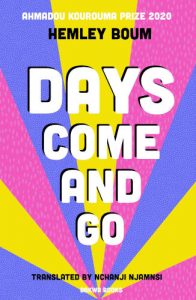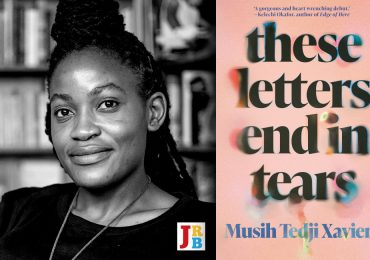The JRB presents an excerpt from Days Come and Go by Hemley Boum, now available in English.

Days Come and Go
Hemley Boum (trans. by Nchanji Njamnsi)
Modjaji Books, 2022
ANNA
I would be dead if not for books. All books.
I devoured every book I could lay my hands on. I read indiscriminately, entranced by the unsuspected parallel galaxies. Literature gave me the means to escape my reality by inviting me into a new world, new ways of being that I could access with my eyes and my mind.
I read and my world lit up. My eyes were opened. I became more aware. I read and nature spoke to me in a language I could understand.
In my village, the nighthawk is considered a bird of ill omen that kills children about to be born. Despite its infamous reputation, its paced, oscillating song brightened my evenings because it heralded blessed moments of solitude when I, released from the constraints of the day and the supervision of the nuns, could throw myself, body and soul, into my reading marathons.
Some nights, unable to put down a book, hypnotised by the terrible fates of the characters, I felt the sleeping presbytery way more than I heard it. The silent cries moths made in their losing battle against the kerosene lamp. The crackling sound from the woods in the quiet of the night. The murmur of the wind sweeping the roof, caressing pillars and leading them in a mystical ballet. The croaking of frogs fighting in a nearby stream, and the hooting of an owl out hunting …
I was there, fully awake. But I was also in the English countryside, where an old madwoman nurtured high hopes for an orphan girl taken in with ulterior motives. Or in a casino in Paris, next to a young man gambling his life away and ultimately trading it for a piece of shagreen. Or in the Russian winter with a young woman named Anna, like me, leaving her husband and child out of love for a man who did not expect that much, and ending up throwing herself under a train out of spite because that’s just the way it is—life and authors severely punish women who fall for crooks.
I jotted down unconnected sentences in a notebook. I have lost the notebook, but I can still remember some passages by heart. Vronsky stared at her the way a man stares at a flower he has harvested, struggling to see in this withering flower the beauty for which he had plucked it and caused it to perish.
Countless worlds offered as a gift! My little room was filling up with ghosts: ladies clad in crinoline dresses, men sporting top hats, noisy train station platforms, men trapped in their thoughts waiting next to a river for a trout to take the bait… Colourful, rich, complex worlds that were all mine, appealed only to me. Colourful, rich, complex worlds created solely for the purpose of this communion—when another person’s creation would connect seamlessly with my inner world, bathing my soul in new, indescribable emotions.
Then came dawn, which I recognised from its fragrance. The darkness outside was stark, but I could feel the already smoother breeze of the morning to come, and the smell of dew on the grass. The stars went out one after the other, lowering the curtains on my window of freedom. I, as if tipped off by an inner infallible clock, knew almost exactly when the first cocks would crow. I would have to get up, take a bath, make breakfast for the sisters, wait for them to finish eating, do the dishes, then clean the yard before heading off to class. So, I read faster. Just one more. Just one more sentence. Let me just finish this paragraph. No, this chapter … Please, I pleaded with time, but my body was all too aware of its chores.
The college library was laden with books. More and more kept coming in—whole boxes of them. Somebody back there in their country was passionate about transforming Africans into knowledgeable beings. Few people took any interest in the books; students contented themselves with the compulsory textbooks on the school curriculum, and the reverend sisters contented themselves with their bible and their prayer book. Books were piling up on the shelves and I made sure they did not gather dust.
The reverend sisters eventually noticed my insatiable hunger for reading. They went from ‘Huh, Anna, you like to read. That is very good!’ to ‘Do you understand all those things you reading?’ Then I overheard them discussing: ‘We should at least monitor what she reads. Such an unsophisticated spirit cannot be exposed to some texts.’ I was saved by the young priest who oversaw extracurricular activities at the college. ‘Reading cannot hurt her, Sister Brigitte. She does not have to understand everything, but these books are meant to be read, right?’ he argued.
I suspect nothing more was said about the matter, not very much because he had convinced them that I was accomplishing the destiny of these books by reading them, but more because these reverend sisters were sure that I did not have what it takes to understand the nuances of the literature I was stuffing myself with.
No one taught me how to analyse a book, how to read from a safe distance, how not to lose sight of context, how to grasp the things left unsaid. No one taught me about schools of thought or even the ideologies meant to give depth to a mundane story. No one taught me aesthetics, language… All these, I discovered in high school while studying the classics, and broadened this knowledge at the Higher Teachers’ Training College in Yaounde, from which I graduated as a French teacher. But I had already developed a habit. All my life, I would read the same way I had started off—intensely, passionately, instinctively—and sentence fragments would stick with me.
Oh, what misfortunes it takes to get the slightest song
What regrets it takes to afford a thrill …
Books soothed my soul, made me angry, made me strong. They made me laugh and cry. They pushed me to examine existence with my own mind, to trust my intuition, to stretch my mind to perceive—against the backdrop of characters, nature, and plot—the intricate symphony of time that beams our being to the world.
As a child, reading made me feel less lonely, less insignificant, less vulnerable. As an adult, I developed enough discernment to understand that, while reading had not made me a better person, it had made me more level-headed towards my own motivations, and freer.
Louis, who would become my husband, was holding a copy of Discourse on Colonialism the first time we met. What does a life boil down to?
~~~
- Hemley Boum is a novelist, poet, and essayist who has authored four novels, including Les Maquisards, which received the Grand prix littéraire d’Afrique Noire, and Days Come and Go (Les jours viennent et passent), which won the Prix Ahmadou-Kourouma and has been translated into German and Dutch. She regularly publishes articles in Jeune Afrique, Le Point Afrique, and Le Monde Afrique, and speaks at colloquia, universities, and literary festivals. Hemley has facilitated master classes in France, Réunion, Cameroon, and Congo, and has been involved in La Fabrique de Souza, a series of literary salons in Douala, Cameroon since 2019. Hemley was born in Cameroon, where she studied anthropology before relocating to Lille, France, to study international trade. She currently lives in Paris, France.
~~~
Publisher information
At the dusk of her life, Anna is cared for by her daughter, Abi––a reversal of roles that draws mother and daughter closer and opens a window into their lives.
Opening with the memories of the dying protagonist, Days Come and Go is the exciting story of three Cameroonian women from three generations: a young Anna who, allured by Western education, finds herself in the midst of a conflict between modernity and tradition; Abi, the journalist, whose liberating idyll with a married artist plunges her tepid family life into turmoil; and Tina, Anna’s young neighbour in Douala, who falls into the clutches of Islamists.
The fates of the women in this novel span––and inevitably intertwine with––the history of Cameroon, from precolonial and colonial times through the independence movements to the contemporary terror of Boko Haram.





